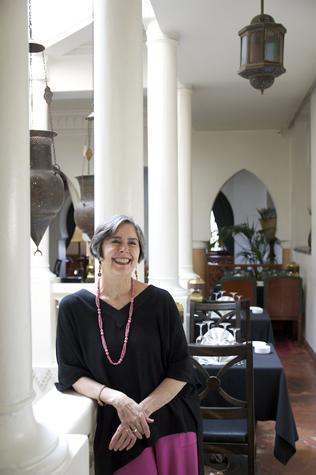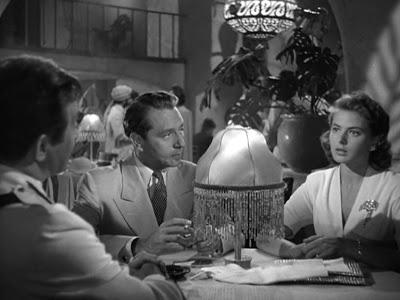By Jennifer Pocock
Seventy years ago today, the first wave of filmgoers wept as the plane to Lisbon buzzed over Rick’s Café. If the unassuming New York City premiere of Casablanca[1] was any indication, few suspected the film would go on to become one of the most beloved Hollywood love stories of all time.
On the silver screen, viewers watched as refugees of all nations gathered at Rick’s Cafe Americain waiting on elusive (and fictional) “letters of transit” that would allow them to flee Morocco[2] in search of safety as World War II raged on.
With its posh interior, moody shadows, and unforgettable music, the cafe became a character in its own right. Few knew — or cared — that it, too, was fictional. It would have ruined the romance of it all.
Now, that’s all changed.

Kathy Kriger brought Rick’s Café to life. (Photograph by Cotton Coulson and Sisse Brimberg, Keenpress)
In 2004, after years of struggle, Kathy Kriger opened up a replica restaurant in a mansion in Casablanca’s Old Medina neighborhood[3]. This time, however, Kriger wanted to bring people to Casa (as the city is affectionately called by locals), not help them escape.
A former American diplomat, Kriger thought that Rick’s would be an ideal place for people from all over the world to come together. After the events of September 11, 2001, the idea became an obsession.
“After 9/11, I thought people would become xenophobic and anti-Muslim,” Kriger says. “I thought that Rick’s Café, just by existing, would show that there was something different about Morocco if an American woman like me could do this all by herself.”
To realize her dream, Kriger drew from every source she could think of — family, friends, and, especially, the film — to ensure her homage was as close to the “original” as possible.
“I’ve watched the movie hundreds and hundreds of times,” she says. “I would also watch it to keep encouraged…I was seeing my goal flashing on the [screen].”
The new Rick’s[4] doesn’t disappoint.
Its dazzling design elements — the soaring chandeliers that grace the high-ceilinged mansion, the special lamps that cast dramatic shadows on the walls, the hand-carved wood and custom tile work — lend a richness to the atmosphere and leave visitors feeling as though they are walking through a piece of art.
The cherry on top of Madame Rick’s restaurant is the grand piano, played by Issam (fittingly pronounced I-Sam), who tickles out 1940s hits — including the classic “As Time Goes By[5]” — on the ivories.
Kriger’s new book, Rick’s Café: Bringing the Film Legend to Life in Casablanca[6] recounts the challenges of navigating Moroccan bureaucracy in an ever-shifting political climate to make her restaurant happen.
In the film, as the camera tilts down over a busy street scene, the narrator sets the tone for the celluloid version of Casablanca: “Here the fortunate ones through money, or influence, or luck, might obtain exit visas and scurry to Lisbon.”
The way Kriger tells it, things haven’t changed much. Money, influence, and luck were all needed to obtain the paperwork and materials needed to get Rick’s off the ground.
The re-envisioned cafe belongs to a continuing trend in Casablanca: that of restoring old buildings to their former glory — and into functioning spaces that drive tourism.
After three years of frustrating fits and starts (including a last-minute attempt by the city’s tourism authority to shut the project down), Kriger was finally able to fling open the cafe’s doors to the public.
She hopes that what happened to her doesn’t happen to anyone else, citing the need for tax incentives to draw investors to the area. But with a new tramway opening soon[7], and progress on a pet project of hers—the restoration of the crumbling Hotel Lincoln[8] into a jazz atelier—Kriger sees hope for Casablanca around the bend.
“Right now it’s still in the painful construction stage,” she admits. “To have all this construction work adds to the tension of living in an already tense place…But the tramway will be a positive influence and good developments will spring up around it.”
Until then, Kriger sits in her alcove at the end of the bar in Rick’s Café and works to bring a new model of corporate citizenship to Casablanca…as time goes by.
Jennifer Pocock is a research fellow at National Geographic Traveler. Follow her story on Twitter@Jenn_Pocock[9].
References
- ^ IMDB site – Casablanca (www.imdb.com)
- ^ National Geographic Travel – Morocco Guide (travel.nationalgeographic.com)
- ^ TripAdvisor site – Old Medina (www.tripadvisor.co.uk)
- ^ Ricks Cafe site (www.rickscafe.ma)
- ^ YouTube site – “As Time Goes By” (www.youtube.com)
- ^ Amazon site – Rick’s Cafe book (www.amazon.com)
- ^ Casa Tramway site (www.casatramway.ma)
- ^ Rick’s Cafe site – Lincoln news (www.rickscafe.ma)
- ^ Jennifer Pocock’s Twitter profile (twitter.com)
